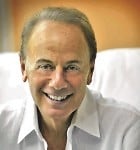 Quogue's reining renaissance man on liberal arts colleges, teaching writing vs. writing, and why he loves south shore winters.
Quogue's reining renaissance man on liberal arts colleges, teaching writing vs. writing, and why he loves south shore winters.
Roger Rosenblatt has been the essayist for TIME and the New York Times, and a correspondent for PBS' NewsHour. He was the New Republic's and US World Report and News' senior editor. He's written 12 nationally acclaimed, often best-selling books. He's amassed a Peabody, an Emmy, and two Polks. And he does not use email. I ask how such a feat is possible in our age of round-the-clock virtual connection. "A combination of inborn stupidity and laziness," he tells me.
The people he cares about communicating with, and the people who care about communicating with him (me), have to pick up the phone. So Rosenblatt, then, is somewhat of an old-schooler. A hyperobservant, savagely witty old-schooler, as evidenced by his newest novel, the new-school satire Beet.
Beet College, named after its wealthy pig-farming founder, is a mire of patrician liberalism, offering classes on Humor and Meteorology, Native American Crafts and Casino Studies, and Little People of Color to its privileged causeless rebels. After its real estate-hungry dean squanders Beet's endowment, the task of rescuing and revamping Beet is left to its one sane faculty member, Professor Porterfield. A situation close to Rosenblatt's-who started teaching at Harvard when he was 22 and has no plans to retire, heart;? "I take [his] point of view...I've had the opportunity to see the nonsense of universities."
And yet, Beet isn't merely an indictment, or a soulless parody, for its author believes that "at the heart of every institution is a teacher who cares about his students." Porterfield is clearly Rosenblatt's fictional counterpart, someone who loves teaching because "it takes you out of yourself."
Rosenblatt considers writing to be "a selfish enterprise," but it's an enterprise whose appeal has yet to wane. For much of his life, Rosenblatt stuck to nonfiction, primarily essays and reporting, until a few years back when he found he'd "exhausted the subject matter. I stopped not because I was making a statement, but because I wanted to devote my energy to plays and novels."
Switching gears paid off, first with the bitingly funny Lapham Rising, which deals with the "change of Quogue" in the past quarter-century, and now with Beet. There are also two one-act plays in the works, one of them based on the chapter in Beet where Porterfield instructs her creative writing class ("the most important chapter"), and another depicting a sixty-something couple on the verge of throwing themselves from the Brooklyn Bridge. And after the plays? Rosenblatt says he doesn't have anything in the works, apart from teaching in the same spot where he used to summer as a child and reveling in the "pleasure of doing normal things, grocery shopping, talking to the local policemen..."
His last real trip was to Rwanda, on assignment for the Times, and he has little interest in more er, lighthearted excursions. "I wouldn't know what to do on a vacation. I walk outside [in Quogue], and it's a vacation." Rosenblatt lives in Quogue year-round, and glories in its beauty even in the winter, when it's "absolutely still." And it's not just Quogue's scenery, but the residents, "honest, smart, funny," who have rooted him here. So what would top his Hamptons can't-miss list, I ask. "The morning light." Roger.
Rosenblatt will be reading from his new plays July 19, at the Stony Brook Southampton Theatre at 7:30 pm.


.jpg)
.jpg)



.jpg)
.jpg)
.jpg)




.jpg)